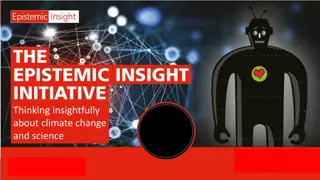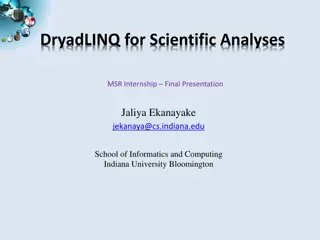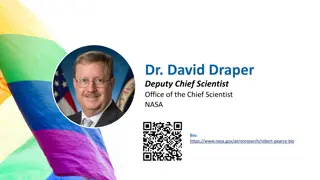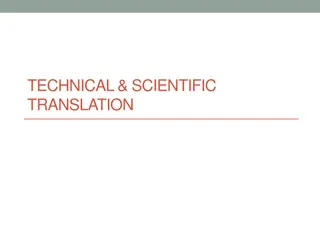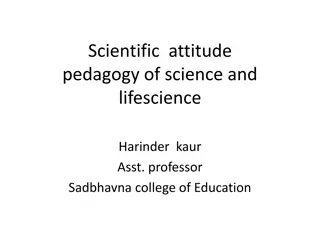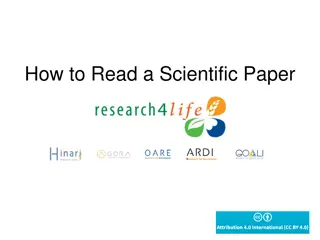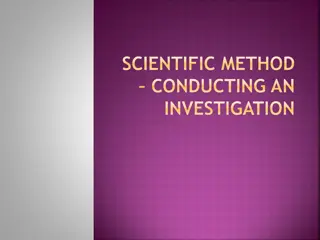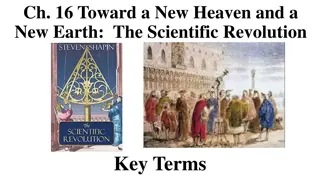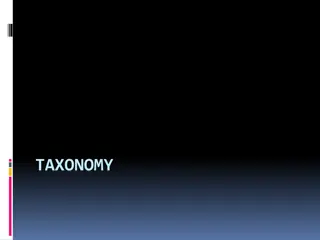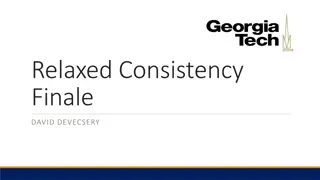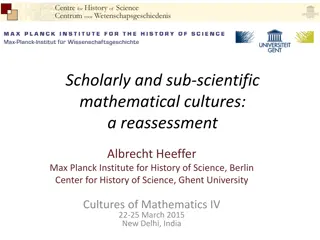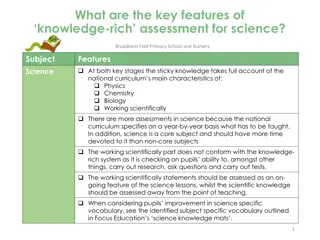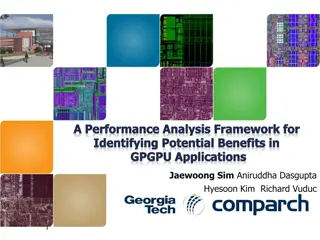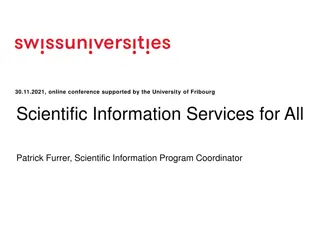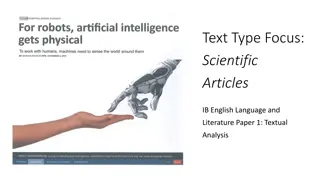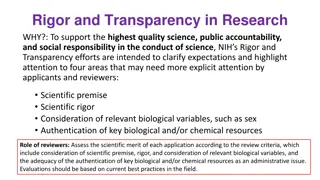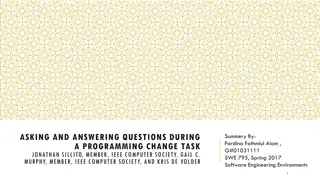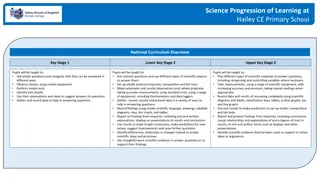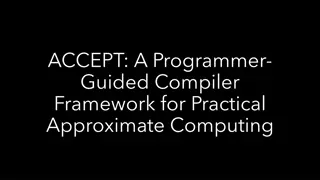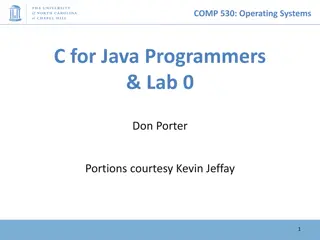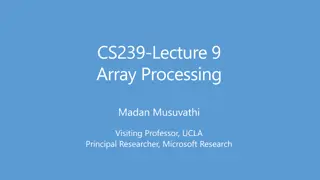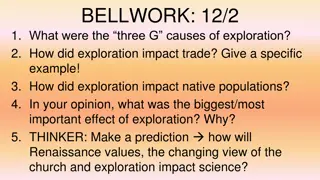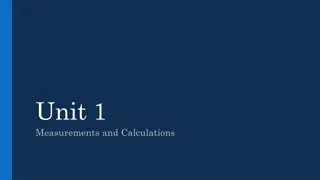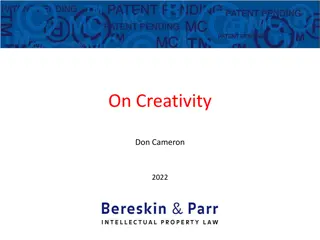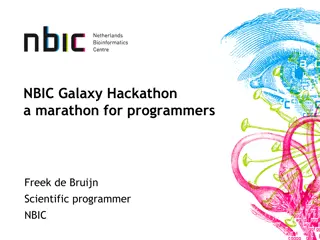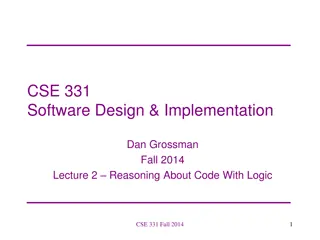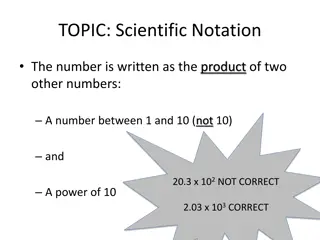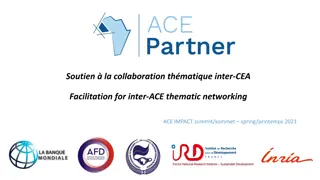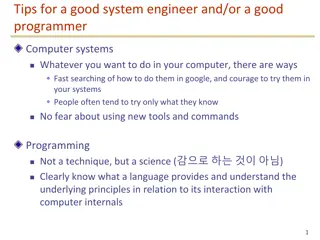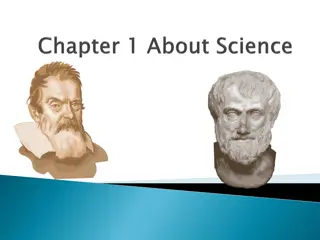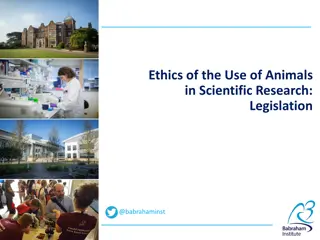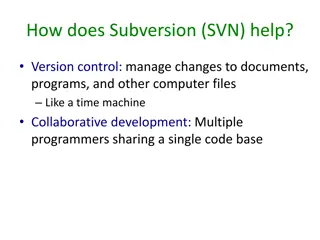Enhancing Scientific Literacy in Early Years Play-Based Learning
This PhD research proposal explores scientific literacy among children in play-based learning, focusing on everyday concepts and their application to scientific understanding. The study aims to implement Vygotsky's sociocultural theory to enhance children's scientific literacy through Vision 1 and V
7 views • 19 slides
Exploring the PROTEOCURE COST Action: Targeting Proteolysis for Proteome Remodeling
The PROTEOCURE COST Action focuses on targeting proteolysis for proteome remodeling, aiming to enhance Europe's scientific and technological capacity through collaboration across various fields and career stages. Participating in this initiative offers financial support, scientific networking, and c
0 views • 17 slides
Climate Change through Scientific Inquiry
Explore the role of science in addressing climate change, identifying scientific questions, discussing different disciplines involved, and analyzing the strength and limitations of scientific methods. Engage in activities to understand how scientific questions are formulated and categorized for inve
2 views • 22 slides
Evaluation of DryadLINQ for Scientific Analyses
DryadLINQ was evaluated for scientific analyses in the context of developing and comparing various scientific applications with similar MapReduce implementations. The study aimed to assess the usability of DryadLINQ, create scientific applications utilizing it, and analyze their performance against
0 views • 20 slides
Overview of NASA's Office of the Chief Scientist and Deputy Chief Scientist Dr. David Draper
The Office of the Chief Scientist (OCS) at NASA plays a vital role in advising, advocating, and representing the agency in various scientific matters. Dr. David Draper serves as the Deputy Chief Scientist. The OCS leads initiatives related to scientific integrity, research security, citizen science,
3 views • 11 slides
Scientific Translation: A Vital Tool for Advancing Knowledge
Scientific translation is a specialized practice that involves accurately translating complex terms in fields such as science and technology to facilitate global knowledge exchange and advancement. It requires precision, fidelity to source material, and a deep understanding of technical terminology
0 views • 60 slides
Scientific Attitude and Pedagogy of Science
Scientific attitude involves open-mindedness, curiosity, rationality, and a desire for accurate knowledge. It includes characteristics such as critical thinking, respect for diverse viewpoints, and a reliance on verified information. Developing a scientific attitude involves studying superstitions,
1 views • 6 slides
Guide to Reading Scientific Papers
Understanding how to read a scientific paper is crucial for researchers and students alike. This guide covers the types of scientific papers, organization of a paper, and the key steps to properly read and comprehend complex scientific information. It explains the different sections of a paper, such
1 views • 20 slides
The Scientific Method: A Comprehensive Guide
Exploring the scientific method and principles of scientific investigation, this guide covers the mindset of a scientist, steps in the scientific method, and key components like formulating questions, conducting research, creating hypotheses, performing experiments, and analyzing results. It emphasi
1 views • 21 slides
Explore the Scientific Revolution
The Scientific Revolution marked a shift from the medieval worldview to a secular, rational, and materialistic perspective. Key terms such as geocentric and heliocentric conceptions, Cartesian dualism, rationalism, and the scientific method played pivotal roles in shaping this transformative period.
7 views • 10 slides
Taxonomy and Scientific Classification
Explore the world of taxonomy and scientific classification, from the discipline of classifying organisms to assigning scientific names using binomial nomenclature. Learn the importance of italicizing scientific names, distinguish between species, and understand Linnaeus's system of classification.
0 views • 19 slides
Discussions on Programmers' Needs, Memory Models, and Consistency in Software Development
Today's discussions covered various topics including what programmers require, the debate on defining memory models for achieving Sequential Consistency (SC), considerations for data-race-free programs, and the performance trade-offs of weaker memory architectures. Insights into partial and relaxed
2 views • 22 slides
Reassessing Scholarly and Sub-Scientific Mathematical Cultures
Scholarly and sub-scientific mathematical cultures are reevaluated through the works of Jens Hoyrup, focusing on the organized nature of sub-scientific knowledge. The distinction between theoretical and practical knowledge, applications to mathematical cultures, and misconceptions related to the sup
0 views • 53 slides
Key Features of Knowledge-Rich Assessment for Science at Broadbent Fold Primary School
Sticky knowledge in science assessment at Broadbent Fold Primary School encompasses Physics, Chemistry, Biology, and Working Scientifically. Assessments are detailed due to the structured national curriculum, with a focus on specific scientific vocabulary and practical applications. The ongoing asse
0 views • 20 slides
Dynamic Memory Management Overview
Understanding dynamic memory management is crucial in programming to efficiently allocate and deallocate memory during runtime. The memory is divided into the stack and the heap, each serving specific purposes in storing local and dynamic data. Dynamic memory allocators organize the heap for efficie
0 views • 31 slides
A Performance Analysis Framework for GPGPU Applications
This framework, GPUPerf, focuses on identifying potential benefits in GPGPU applications through performance analysis, modeling, and user-friendly metrics. It addresses the challenges programmers face in optimizing GPGPU code, providing guidance on program analysis and performance modeling. The fram
0 views • 26 slides
Scientific Services for All - Enhancing Scientific Information and Services
This online conference, supported by the University of Fribourg, focuses on providing scientific information and services for all. Led by Patrick Furrer, the Scientific Information Program Coordinator, the event delves into creating a network of services, developing a coordination structure, and sho
0 views • 12 slides
Quiz Review on Scientific Method and Graphing
Explore a quiz review covering topics related to scientific method, graphing, and experimental design. Understand key concepts such as hypothesis, scientific law, theory, variables, and experimental control through detailed questions and images. Test your knowledge on laboratory safety, inferences,
0 views • 14 slides
Unveiling the Art of Scientific Article Writing
Delve into the world of scientific articles in IB English Language and Literature Paper 1. Understand the purpose, use of language, comparisons, and visuals in scientific writing. Explore how these elements engage readers and simplify complex concepts through examples like stethoscopes and swamp wat
0 views • 9 slides
Fusion Science Department Enabling Research Projects 2021-2023
The Fusion Science Department Enabling Research Projects for 2021-2023 focus on developing novel fusion-relevant scientific and technological ideas. These projects, led by Principal Investigators, are distinct from main work packages and involve scientific planning, team collaboration, and resource
0 views • 11 slides
Enhancing Research Quality through Rigor and Transparency Initiatives
NIH's Rigor and Transparency efforts aim to uphold the highest standards in research, ensuring scientific premise, rigor, consideration of relevant biological variables, and authentication of key resources. Reviewers play a critical role in assessing these aspects to support robust and accountable s
0 views • 9 slides
Programmer Questions and Tool Support During Code Evolution Tasks
This study investigates the types of questions programmers ask and how well existing tools support them during software evolution tasks. It introduces a catalog of 44 question types and discusses behaviors observed while answering these questions. The study highlights the gaps in tool support for pr
0 views • 11 slides
Science Progression of Learning at Hailey CE Primary School Overview
This curriculum overview outlines the scientific learning progression for pupils at Hailey CE Primary School across Key Stage 1, Lower Key Stage 2, and Upper Key Stage 2. It details the development of scientific skills and knowledge, from asking simple questions and making observations to planning a
0 views • 11 slides
ACCEPT: A Programmer-Guided Compiler Framework for Practical Approximate Computing
ACCEPT is an Approximate C Compiler framework that allows programmers to designate which parts of the code can be approximated for energy and performance trade-offs. It automatically determines the best approximation parameters, identifies safe approximation areas, and can utilize FPGA for hardware
0 views • 15 slides
Operating Systems in C for Java Programmers
This content delves into the intricacies of operating systems using C programming language, aimed at Java programmers. It covers basic syntax, data types, pointers, memory placement, function pointers, and more, providing a comprehensive overview with examples and explanations.
0 views • 23 slides
SciDB: Revolutionizing Data Management for Scientific Analytics
SciDB is an open-source analytical database designed to meet the complex data management needs of the scientific community. It offers a unique array-based data model that supports advanced linear algebra operations crucial for scientific analytics. By addressing the limitations of traditional relati
0 views • 39 slides
Impact of Exploration and Scientific Revolution on Society
Exploration in the age of discovery was driven by economic, political, and religious motives, impacting trade and native populations while leading to significant scientific advancements and changes in societal beliefs. The Scientific Revolution challenged traditional views with new scientific method
0 views • 19 slides
Scientific Notation and SI Measurement Basics
Explore scientific notation as a method for expressing large and small numbers efficiently in mathematical calculations. Practice converting numbers into scientific notation and learn the rules for multiplication, division, addition, and subtraction in this format. Additionally, discover the benefit
0 views • 41 slides
Insights on Scientific Creativity and Imagination in Science
Explore the origins of ideas, the scientific method, and the role of imagination in scientific discovery through the perspectives of renowned figures like Isaac Asimov, Richard Feynman, and Donald M. Cameron. Delve into the interplay between creativity, constraints, and reality in the pursuit of sci
0 views • 31 slides
Insights from NBIC Galaxy Hackathon: Building Community and Learning Experiences
NBIC Galaxy Hackathon, a marathon for programmers, brought together bioinformatics experts and programmers to collaborate on innovative projects. The event showcased the community-building efforts, technological advancements, and learning experiences gained through modifying Galaxy, a bioinformatics
0 views • 9 slides
Scientific Notation in Mathematics and Chemistry
Scientific notation is an essential concept for representing very large or very small numbers efficiently. It simplifies numbers by expressing them as a coefficient multiplied by a power of 10. This summary covers the basics of scientific notation, from converting numbers to and from scientific nota
0 views • 55 slides
Scientific Method: Pre-Test and Daily Agenda
Explore the process of science with a pre-test on the scientific method, followed by a detailed daily agenda covering activities like bell-ringers, reviews, and experimental design. Understand the nature of science, scientific reasoning, and the importance of variables, groups, and constants in inve
0 views • 51 slides
Logical Reasoning in Software Design and Implementation
Logical reasoning in software development involves determining the truth of facts as a program runs under specific assumptions. This process complements testing by allowing programmers to reason about classes of inputs/states and verify program correctness. Hoare Logic is introduced as a method for
0 views • 35 slides
Scientific Notation: Converting, Multiplying, Dividing & More
Scientific notation is a way to express large or small numbers efficiently. Learn how to convert numbers to and from scientific notation, multiply and divide in scientific notation, and ensure proper formatting. Understand the rules for exponents and make calculations easier with these simple steps.
0 views • 8 slides
Facilitation for Inter-ACE Thematic Networking at ACE IMPACT Summit Spring 2021
Supporting collaboration among thematic networks, this initiative facilitates networking for sustainable development through scientific excellence and higher education programs tailored to local needs. Governed by a strategic committee, the project aims to address key development challenges, build k
0 views • 9 slides
Essential Tips for Successful System Engineers and Programmers
Valuable insights for aspiring system engineers and programmers include embracing new tools and commands, understanding programming as a science, mastering algorithms, evaluating their efficiency, and adopting experimental approaches to analyze running times accurately.
0 views • 35 slides
Evolution of Scientific Thought and the Scientific Method
Explore the evolution of scientific theories and methodologies through the works of influential figures like Aristotle, Copernicus, Galileo Galilei, and Francis Bacon. From the geocentric beliefs of Aristotle to the heliocentric model proposed by Copernicus, witness the shift in paradigms and the em
0 views • 14 slides
Regulations and Ethics of Animal Use in Scientific Research
The use of animals in scientific research is well-regulated in the UK under the Animals (Scientific Procedures) Act 1986. This legislation aligns with the European Directive 2010/63/EU to protect animals used for scientific purposes. The Home Office issues licences to institutions and project scient
0 views • 15 slides
The Benefits of Subversion (SVN) for Version Control and Collaborative Development
Subversion (SVN) acts as a time machine, allowing programmers to manage changes to documents and files efficiently. It enables collaborative development by facilitating multiple programmers to work on a single code base seamlessly.
0 views • 8 slides
Standard Units for Scientific Excellence | Goel Scientific
Browse high-quality standard units designed for scientific and industrial applications at Goel Scientific.
1 views • 11 slides


